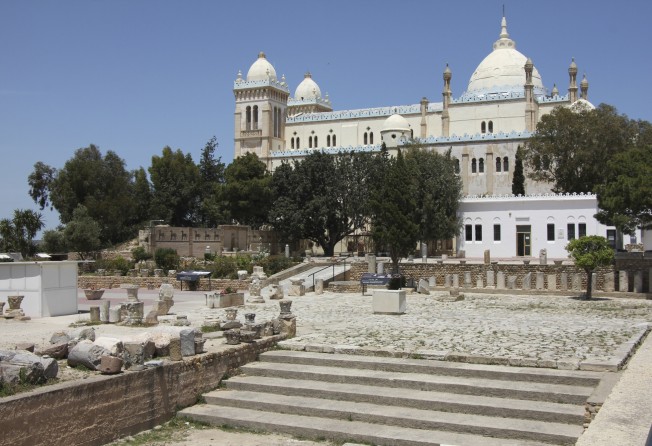
As US-China tensions rise, the Punic wars offer a cautionary tale
- Rather than rely on the recently popular ‘Thucydides trap’, the clashes between Carthage and Rome might provide better insight into our current predicament
- The triumph of political will, military technology and economic power over calls for peace and respect for the environment show how dire succumbing to war can be

As the United States and China face off in the latest clash between great powers, we need to delve into history to see whether there are parallels from which we can learn. I have previously pointed out how the “Thucydides trap” – an idea popularised by Harvard scholar Graham Allison based on Greek historian Thucydides’ description of the Peloponnesian War between Athens and Sparta – might not be the most appropriate analogy for the modern age.
A more interesting historical clash of great powers would have been Rome versus Han China, but that never happened. In comparative terms, the Roman empire had an estimated 75 million people at one point and covered an area of about 5 million sq km. Meanwhile, the Han dynasty had roughly 60 million people and controlled an area of about 6.5 million sq km.
Rome exercised both land and naval power, whereas Han China was essentially land-based. The two empires never clashed because they were separated by vast geographical distance. The first recorded direct contact between the two empires was through Roman emissaries sent to the Han court during the reign of Roman Emperor Marcus Aurelius Antoninus.
The more telling clash of empires was between Rome and Carthage during the three Punic wars. Carthage was essentially an older, Phoenician maritime power that controlled trade in the Mediterranean Sea, backed up by fertile lands in northern Africa.
Rome was the rising power, expanding outward at the time of the first Punic war. Carthage was more interested in guarding its trading monopoly in the western Mediterranean, whereas Rome was invested in expansion through conquest.
The first Punic war began with Carthage being the dominant naval power while Rome had the stronger land army. Before the outbreak of war, Rome and Carthage had good commercial ties and friendly relations, but one can imagine that Carthage probably ran trade surpluses with Rome since it controlled the Mediterranean trade.
Carthage relied more on hiring mercenaries and less on its own citizens to fight in wars. Rome, on the other hand, had mostly citizen-soldiers whose fortunes depended largely on victory and conquest.
Once Carthage began to lose its naval superiority, there was a period of attrition in which both sides fought indecisively with severe consequences for both. In 241 BC, Rome won the naval Battle of Aegates. Carthage ceded control of Sicily to Rome and paid terrible reparations.

After its loss, Carthage had to fight off a mercenary uprising led by discontented unpaid mercenaries who were joined by a rebellion of other Africans in Carthage’s oppressed territories. To defend the empire, the Carthaginian general Hamilcar consolidated control over the Iberian Peninsula. In the second Punic war, his son Hannibal took the conflict to the Italian peninsula by marching through the Alps and fighting on Roman territory.
The Romans regrouped after initial losses and, once the Numidians rebelled against Carthage, the Roman general Scipio landed in Africa in 204 BC to march on Carthage with his Numidian allies. Hannibal was soundly defeated in the Battle of Zama. After suing for peace, Carthage was stripped of its overseas territories and had to pay ruinous reparations.
The Numidians then ate at Carthaginian power, with Carthage being finally destroyed in the third Punic war. Carthaginians were sold into slavery and the whole region was incorporated as a Roman province. When the Germanic Vandals conquered Carthage in 439 AD, the days of the Western Roman empire were numbered.
The Punic wars demonstrated that political will, military technology and discipline – plus economic power over food, energy and minerals – ultimately matter the most in great power rivalry. Great power conflicts have their origins in national, sectoral and human interests, but historically they occurred with little regard for the environment. Roman deforestation of the empire’s lands, as well as the Spanish conquest of the Americas, had serious climatic consequences that only became apparent later.

In his book Global Crisis, historian Geoffrey Parker documents how the Little Ice Age contributed to revolutions and the collapse of Ming China and the Polish-Lithuanian Commonwealth, as well as tumult in the Ottoman, Russian and Mughal empires, Sweden, Denmark and the Dutch Republic. One of the reasons cited for that mini-ice age was the devastation of native populations in the Americas in the 16th century leading to reforestation that helped bring down global temperatures.
We are now witnessing climate change, technology, demographics, growing social inequality and geopolitical rivalry all converging into a planetary state of disorder; no single nation is powerful enough to restore the status quo ante. Many of us are disoriented by an age of misinformation and disinformation, where societies and communities are polarised by narratives which push people towards extreme positions. There is no centrist coalition strong enough to restore a balanced view of moderation and tolerance.
Balance has been lost because populists and elites profit from imbalance. The Punic wars showed that, more often than not, human beings fight over short-term interests rather than working towards building long-term peace. War that appears glorious ends up causing long, ruinous trauma for both people and the planet. It is easier to shout for war than to work for peace. For those who care about our future generations, give peace a chance.
Andrew Sheng writes on global issues from an Asian perspective